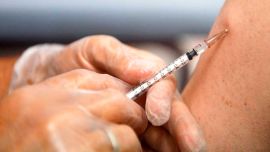Argentina’s lower house of Congress approved a bill that underpins the government’s US$45-billion agreement with the International Monetary Fund in the early hours of Friday morning, a key step toward its final approval.
In a 200-37 vote, with 15 abstentions, lawmakers in the Chamber of Deputies voted in favour of the deal after a marathon session that ended at around 3am in Buenos Aires. The bill will head to the Senate in the coming days, and if approved by lawmakers, goes to the IMF’s Executive Board to become final.
The bill will be discussed at committee stage in the Senate from Monday, parliamentary sources said. After two years of negotiations, the government wants to close a deal before a March 22 payment to the IMF worth US$2.9 billion comes due and avoid a potential default with the Washington-based lender.
The credit programme will serve to refinance US$45 billion in outstanding debt from the stand-by agreement granted in 2018 to the government of former president Mauricio Macri, which contemplates maturities of about US$19 billion this year and another US$20 billion in 2023, plus another US$4 billion in 2024.
Division
President Alberto Fernández’s decision to make the national legislature vote on the agreement – a consequence of previous legislation making such a move compulsory – has exposed a clear divide with opposition lawmakers and within his own Peronist coalition, Frente de Todos.
Key lawmakers, most from the hard-line Kirchnerite wing of Fernández’s ruling coalition, criticised the president’s negotiation strategy and came out against the deal. The government ultimately conceded on changes to the text this week in order to win over more opposition support.
Juntos por el Cambio provided more than half of votes in favour, while the 37 “no” votes were dominated by lawmakers linked to Vice-President Cristina Fernández de Kirchner and the La Cámpora youth organisation.
Among those who voted against the deal was Máximo Kirchner, the vice-president’s son, who resigned as head of the Frente de Todos caucus in the lower house to underline his rejection of the deal.
In a statement issued Friday, La Cámpora said that it did not oppose negotiations with the Fund, nor the paying of debt.
"The problem is not signing with the Fund. It is clear that if we have a debt, we have to sign the agreement. But the problem is what to sign. The recognition of the debt does not imply forgetting the responsibilities that are being discussed in criminal proceedings," read the statement, referring to an ongoing judicial investigation against Macri related to his decision to take on the loan.
The agreement was also opposed by the minority benches of the left and the so-called "libertarian right."
‘Poverty and pain’
While Fernández de Kirchner, who serves as head of the Senate, had stayed silent on the deal itself, early Friday she published a video showing damage to her office after protesters threw stones at the building during the debate and pointing to the “poverty and pain” of past IMF policies had caused.
With a fragmented ruling coalition, the vote in Congress was the government’s way of showing the IMF that the deal has ample political ownership, a top requirement for such agreements.
The agreement would be Argentina’s 22nd with the IMF and the latest chapter in a tumultuous relationship. The new loan seeks to refinance payments Argentina owes the Fund stemming from a record bailout to the nation in 2018 that failed to stabilise the economy at the onset of a recession.
The new extended facilities fund programme lengthens payment deadlines, provides for 10 quarterly reviews and a four-year grace period. Payments are due from 2026 to 2034.
"This is the best refinancing agreement that could be achieved," lawmaker Carlos Heller, of the ruling Frente de Todos coalition, said Friday.
Rejection of the bill "would lead us to serious problems that we must avoid at all costs," he added.
"This is no time for opportunism. The opposition should facilitate the possibility of restructuring the debt, but we cannot take responsibility for the programme that the government negotiated with the IMF," said opposition lawmaker Facundo Manes.
Head of the ruling coalition's caucus in the lower house, German Martínez, said the deal gave "time that allows us to consolidate, boost a process of economic recovery."
"That will allow us to be in better shape in four-and-a-half years to start facing the payments, and we are going to make them without adjustment," he declared.
Protests
The lower house’s approval of the bill was marred by violence outside the National Congress building, as demonstrators from left-wing groups and social movements demonstrated in rejection of the deal, which they argue commits Argentina to austerity.
Some protesters burned rubbish and threw rocks and stones, while one police officer was hit by a Molotov cocktail. Some windows, including those in Fernández de Kirchner's office, were smashed.
The vice-president, who led Argentina as head of state from 2007 to 2015, will lead parliamentary debate on the vote next week in her role as Senate chief.
Once the agreement is ratified, Argentina will receive a first disbursement of around US$ 9.8 billion, which will be used to pay the US$2.9-billion maturity due March 22 and boost international reserves.
Central Bank reserves stand at US$37.3 billion, but liquid reserves are at critical levels. The institution’s Vice-President Jorge Carrera said Thursday: "If the agreement is not approved in Congress we are in trouble."
The new agreement, described by the IMF as "pragmatic and realistic," commits Argentina to a reduction of its fiscal deficit from three percent of GDP to 0.9 per cent by 2024.
– TIMES/AFP/BLOOMBERG



















Comments